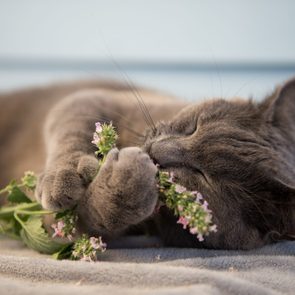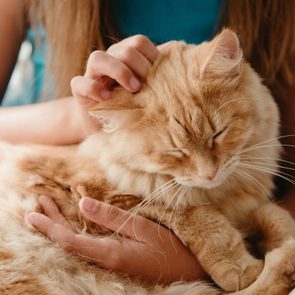Why Do Cats Love the “Pspspsps” Noise So Much?
Updated: Mar. 25, 2022

Why does "pspspsps" seem to be the Rosetta Stone of inter-species communication?
Whenever I need to beckon a cat—a need that arises frequently (oh yes, I need that cat to come over here like I need air)—the “pspspsps” has never failed me. It’s a tried and true head-turner, if not ear-turner. I’ve never met a cat who hasn’t heard it then looked back at me as if I’ve just had the audacity to ask if they could actually lower their tail instead of walking around with it straight up in the air like a bumper car, bearing the entirety of their derrière right here before God and everyone. (By the way, that habit may be a little unsightly, but it’s actually one of the sure signs your cat truly trusts you.)
For a species both feared and revered for its sheer indifference towards whether you live or die, it’s a chink in the armor that’s almost, well, embarrassing for them. But considering the lows we’re willing to sink to in the name of endearing ourselves to them, maybe cats’ gauge for embarrassing behavior is a bit skewed. Nevertheless, I am awed by the power of the “pspspsps”; it’s sonic catnip.
The intricacies of cat-human communication have been at the forefront of scientific study, and (even more meticulously in the case of the “pspspsps”) Internet culture, as if something true must be equal parts explainable and relatable:
If you have any questions just go pspspspsps and I'll come to you pic.twitter.com/zbAfWAhqhG
— Bandito (@BorkinMan) November 11, 2019
Seemingly the first to so deftly articulate the potency of the “pspspsps,” this tweet was liked by over 40,000 and shared by over 16,000. It was reposted by other Twitter users and saw upwards of 390,000 likes and 121,000 shares, quickly making rounds on Facebook, Instagram, and Reddit, speaking to the virality of a device that apparently hordes of us know all too well. And we wouldn’t all be familiar with it if it weren’t so effective. See if they’re “pspspspsing” back at you with these 10 noises your cat makes and what they all mean.
OK, but why?
According to Dr. Péter Pongrácz, Professor of Ethology at Eötvös Loránd University, “people developed long ago these types of cat-calling noises that we learn culturally from our parents, grandparents, etc.—always [in] that language, which is our mother tongue.” It’s likely the “pspspsps” has roots in English: A “here, pussy, pussy, pussy” call devolved. Texas western swing band The Light Crust Doughboys helped popularize the phrase when they crooned it to the masses in their 1938 jukebox hit “Pussy, Pussy, Pussy” about a girl trying to track down her lost cat. In a 1955 episode of Tom and Jerry, you can even see Nibbles, Jerry’s protégé, call “here, pussy, pussy, pussy” in an attempt to draw out Tom.
The fact that “here, pussy, pussy, pussy” and the now popular “pspspsps” stuck isn’t an anomaly—there’s an underlying auditory blueprint responsible for its success. Susanne Schötz, Associate Professor of Phonetics at Lund University and author of The Secret Language of Cats, notes that the “s” in “pspspsps” operates at a frequency much higher than most speech sounds, one to which cats, capable of hearing frequencies as high as 85kHZ compared to the human 20kHz, are especially sensitive. “Pspspsps” is probably just an abridged version of “here, pussy, pussy, pussy” with only the important stuff—the stuff that works—preserved. Plus, Dr. Ahna Brutlag of the Pet Poison Helpline explains that “it’s an abrupt sound that’s often not encountered in a typical environment; therefore, it’s ‘ear-catching.’”
Rodents communicate in high frequency, so cats have evolved to detect it: Large, funnel-shaped ears and small skulls allow them to perceive the sounds of their natural prey. “High-pitched squeaking vocalizations are roughly approximated by the human ‘hissing’ syllables ‘s,’ ‘c,’ and ‘ts,’” says Pongrácz. Thus, the “s” in “pspspsps” and “ksksksks,” which Schötz also uses to signal her cats in Swedish, is an apt cat attention-grabber. Once the feline is able to determine that the source of the ‘ear-catching’ sound is non-threatening, they might come over to investigate—should you be so lucky. Next, get to the bottom of another Internet-famous cat quirk: Why are cats so afraid of cucumbers?






















